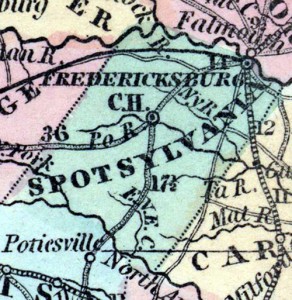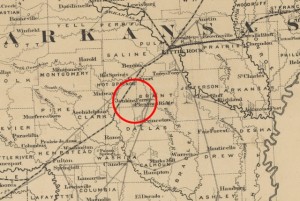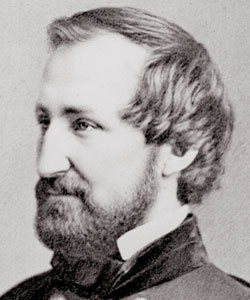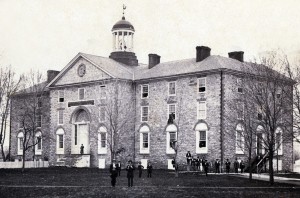 William Patrick Willey, Dickinson College Class of 1862, was determined to graduate even though all odds seemed to be against him. As a junior in college, Willey’s world erupted as his country went to war with itself after the battle of Fort Sumter on April 12, 1861. Ten days later Willey wrote his father, the future West Virginia senator Waitman T. Willey, of the precarious situation he was in as a Southern student in Carlisle, Pennsylvania. William sent two letters to his father within a one week period: one on April 22 and the second on April 29. Within this week William perceived that the situation in Carlisle had changed dramatically. In his first letter, William described the excited mobs of townspeople at the train station: “women bidding adieu to their husbands and sons.” Though a committee from the town approached the college’s president, Dr. Herman Merills Johnson, informing him that Southern students must either leave or take an oath of allegiance, William told his father that he would try to stay as long as he could: “I fear nothing yet. The only ones that are in danger are the students from S.C.” One week later, William and his friend McCants were the only Southern students left. Now however, Carlisle residents complimented William on his dedication for remaining at school. More often, William wrote, he and McCants were approached for their opinion as Southerners because “in Carlisle the prominent desire seems to be that of getting a hold on Jeff Davis.” William’s two letters document the remarkable shift in emotions of Carlisle residents after the immediate shock of Fort Sumter wore off—by April 29th it appeared that the women of Carlisle no longer felt it necessary to arm themselves with broomsticks against a possible Southern attack. After graduating, William P. Willey went on to earn his law degree and became a law professor at West Virginia University, where he founded the West Virginia Law Review in 1894.
William Patrick Willey, Dickinson College Class of 1862, was determined to graduate even though all odds seemed to be against him. As a junior in college, Willey’s world erupted as his country went to war with itself after the battle of Fort Sumter on April 12, 1861. Ten days later Willey wrote his father, the future West Virginia senator Waitman T. Willey, of the precarious situation he was in as a Southern student in Carlisle, Pennsylvania. William sent two letters to his father within a one week period: one on April 22 and the second on April 29. Within this week William perceived that the situation in Carlisle had changed dramatically. In his first letter, William described the excited mobs of townspeople at the train station: “women bidding adieu to their husbands and sons.” Though a committee from the town approached the college’s president, Dr. Herman Merills Johnson, informing him that Southern students must either leave or take an oath of allegiance, William told his father that he would try to stay as long as he could: “I fear nothing yet. The only ones that are in danger are the students from S.C.” One week later, William and his friend McCants were the only Southern students left. Now however, Carlisle residents complimented William on his dedication for remaining at school. More often, William wrote, he and McCants were approached for their opinion as Southerners because “in Carlisle the prominent desire seems to be that of getting a hold on Jeff Davis.” William’s two letters document the remarkable shift in emotions of Carlisle residents after the immediate shock of Fort Sumter wore off—by April 29th it appeared that the women of Carlisle no longer felt it necessary to arm themselves with broomsticks against a possible Southern attack. After graduating, William P. Willey went on to earn his law degree and became a law professor at West Virginia University, where he founded the West Virginia Law Review in 1894.
23
Jun
10
William P. Willey’s April 1861 letters
Posted by solnitr Published in Civil War (1861-1865), Letters & Diaries Themes: Carlisle & Dickinson23
Jun
10
Carlisle Fencibles
Posted by mckelveb Published in Civil War (1861-1865), Letters & Diaries, Rare Books Themes: Battles & Soldiers, Carlisle & Dickinson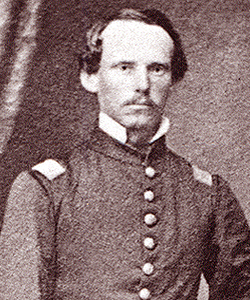 After the outbreak of the Civil War, four volunteer companies originally consisting of fifty to one hundred men were recruited in Carlisle, Pennsylvania on April 19, 1861. On April 21, the officers were chosen with Captain Robert M. Henderson, in charge of Company A of the 36th Regiment, 7th Pennsylvania Reserve Corps. Henderson was assisted in command by First Lieutenant James S. Colwell, Second Lieutenant Erkuries Beatty, and First Sergeant John D. Adair. These men received the nickname “Carlisle Fencibles” in part because most of its members belonged to a gymnastic club and because a “fencible” is a defender of a country. The company spent a two month period of relative inactivity marching and drilling until the soldiers left for Camp Wayne in West Chester, Pennsylvania on June 6. Before the men departed they received a satin flag from Mrs. Samuel Alexander, a granddaughter of Ephraim Blaine, that, according to David G. Colwell, had the inscription “May God defend the right!” The 7th Pennsylvania Reserves went on to fight in the Battles of Gaines’ Mill, Bull Run, and Antietam while suffering great losses. A more thorough description of the experiences of the company is available on Google Books in Samuel B. Bates’ History of Pennsylvania Volunteers, 1861-65 . The wartime experience of one member of the Carlisle Fencibles, John Taylor Cuddy, is chronicled through letters he sent home to his family in Carlisle. His correspondence is available as a part of Dickinson College’s “Their Own Words” digital archive which provides a picture of the experience of a young Carlisle Fencible during the Civil War.
After the outbreak of the Civil War, four volunteer companies originally consisting of fifty to one hundred men were recruited in Carlisle, Pennsylvania on April 19, 1861. On April 21, the officers were chosen with Captain Robert M. Henderson, in charge of Company A of the 36th Regiment, 7th Pennsylvania Reserve Corps. Henderson was assisted in command by First Lieutenant James S. Colwell, Second Lieutenant Erkuries Beatty, and First Sergeant John D. Adair. These men received the nickname “Carlisle Fencibles” in part because most of its members belonged to a gymnastic club and because a “fencible” is a defender of a country. The company spent a two month period of relative inactivity marching and drilling until the soldiers left for Camp Wayne in West Chester, Pennsylvania on June 6. Before the men departed they received a satin flag from Mrs. Samuel Alexander, a granddaughter of Ephraim Blaine, that, according to David G. Colwell, had the inscription “May God defend the right!” The 7th Pennsylvania Reserves went on to fight in the Battles of Gaines’ Mill, Bull Run, and Antietam while suffering great losses. A more thorough description of the experiences of the company is available on Google Books in Samuel B. Bates’ History of Pennsylvania Volunteers, 1861-65 . The wartime experience of one member of the Carlisle Fencibles, John Taylor Cuddy, is chronicled through letters he sent home to his family in Carlisle. His correspondence is available as a part of Dickinson College’s “Their Own Words” digital archive which provides a picture of the experience of a young Carlisle Fencible during the Civil War.
22
Jun
10
Outbreak of War at Dickinson College
Posted by rainwatj Published in Civil War (1861-1865), Letters & Diaries Themes: Carlisle & Dickinson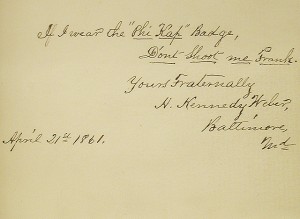 The Dickinson College student body was evenly divided between Northern and Southern students who fought on both sides of the conflict. The split is well documented in Dickinson College class of 1861 student Francis Benjamin Sellers’ Autograph Album for the Phi Kappa Sigma Fraternity. Taken from the Phi Kappa Sigma News Letter, Fall, 1954:
The Dickinson College student body was evenly divided between Northern and Southern students who fought on both sides of the conflict. The split is well documented in Dickinson College class of 1861 student Francis Benjamin Sellers’ Autograph Album for the Phi Kappa Sigma Fraternity. Taken from the Phi Kappa Sigma News Letter, Fall, 1954:
“On April 21, 1861, Epsilon held its last meeting shortly past midnight. All of the members gathered in the room of John. E McCahan and Francis B. Sellers in West College and dispensed with the usual forms of business so that the brothers could say their last farewells before leaving for their respective armies.”
Dickinson College students expected to encounter one another on the battlefield, which is reflected in the comments left in the autograph album. Howard Kennedy Weber class of 1863 remarked: “If I wear the “Phi Kap” badge, don’t shoot me Frank.”
Other Dickinson College students featured in Sellers’ album that fought in the conflict include fellow classmates Elbridge Hoffman Gerry, James Glasgow Archer, William Miller Ogilby and Ernest Dudley Martin.
22
Jun
10
The Battle of the Wilderness, May 5-7, 1864
Posted by mckelveb Published in Civil War (1861-1865), Images, Lesson Plans, Maps, Places to Visit Themes: Battles & SoldiersThe Battle of the Wilderness (also known as Combats at Parker’s Store, Craig’s Meeting House, Todd’s Tavern, Brock Road, and the Furnaces) took place from May 5-7, 1864 in Spotsylvania County, Virginia as a part of Union General Ulysses S. Grant ’s overland campaign. Grant’s troops attacked General Robert E. Lee and the Army of Northern Virginia on May 5 and a fierce fight broke out between the soldiers. There were high casualties on both sides, including Union General James Wadsworth and Confederate General John M. Jones. The National Park Service’s website provides a detailed overview of the fighting and profiles on various historical figures that fought in the battle. Teachers may find the suggested reading list and the information for visiting the battlefield posted on the website useful for planning a fieldtrip to the area. The National Park Service also includes a virtual tour of the battleground for those that cannot make the trip as well as photos of the different sites and monuments. The Civil War Preservation Trust’s website has some interesting historical maps which may be valuable to take a look at. A study of the Battle of the Wilderness may be useful to incorporate into lessons on African American troops in the Civil War since the 43rd USCT served in the Wilderness Campaign along with other United States Colored Troop regiments. A previous post outlines the actions of the 43rd USCT during the Wilderness campaign. Gordon C. Rhea commented on the outcome of the battle in his book:
“The recent carnage could be viewed as the opening salvo of a protracted battle to end the war in Virginia. Grant’s directive represented the maturation of his thinking. Lee, Grant was conceding, could not be beaten here. But the campaign was not over. Grant would fight again, next time on the fields that offered him the upper hand. Lincoln’s new commander in chief had been checked, but not defeated. “
22
Jun
10
The John Taylor Cuddy Correspondence
Posted by solnitr Published in Civil War (1861-1865), Letters & Diaries Themes: Battles & Soldiers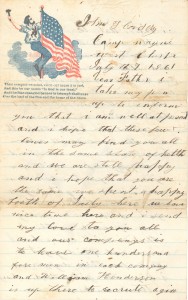 Sixteen-year-old John Taylor Cuddy left his home in Carlisle, Pennsylvania to enlist in Company A of the 36th Pennsylvania Infantry on June 5, 1861. Over the next two years, Cuddy wrote 77 letters home to his family describing his experiences as a soldier in the Union army. Cuddy’s correspondence is available online as part of Dickinson College’s “Their Own Words” digital archive. Over the course of his service in the army, Cuddy wrote his parents full of exuberance to go “lick the south” from his training camp at Fort Wayne, with a tempered tone of experience after fighting in the battle of Gaines’ Mill, and with a critical analysis of “old abe[‘s]” Emancipation Proclamation. At the Battle of the Wilderness, which lasted from May 5 to 7, 1864, Cuddy’s regiment was captured and sent to Andersonville, a Confederate prisoner of war camp in Georgia. With his capture, Cuddy’s letters stopped. Although John Taylor Cuddy never made it home to Pennsylvania (he died in a prison in Florence, South Carolina on September 29, 1864), his correspondence creates a living picture of the life of a teenage Pennsylvania soldier during the Civil War.
Sixteen-year-old John Taylor Cuddy left his home in Carlisle, Pennsylvania to enlist in Company A of the 36th Pennsylvania Infantry on June 5, 1861. Over the next two years, Cuddy wrote 77 letters home to his family describing his experiences as a soldier in the Union army. Cuddy’s correspondence is available online as part of Dickinson College’s “Their Own Words” digital archive. Over the course of his service in the army, Cuddy wrote his parents full of exuberance to go “lick the south” from his training camp at Fort Wayne, with a tempered tone of experience after fighting in the battle of Gaines’ Mill, and with a critical analysis of “old abe[‘s]” Emancipation Proclamation. At the Battle of the Wilderness, which lasted from May 5 to 7, 1864, Cuddy’s regiment was captured and sent to Andersonville, a Confederate prisoner of war camp in Georgia. With his capture, Cuddy’s letters stopped. Although John Taylor Cuddy never made it home to Pennsylvania (he died in a prison in Florence, South Carolina on September 29, 1864), his correspondence creates a living picture of the life of a teenage Pennsylvania soldier during the Civil War.
21
Jun
10
Frederick Douglass – Visit to Carlisle in 1872
Posted by sailerd Published in Historic Periodicals, Reconstruction (1865-1880) Themes: Carlisle & Dickinson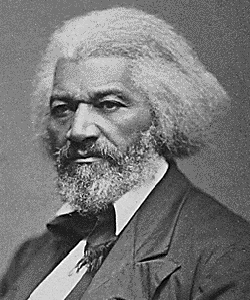 Frederick Douglass gave a speech in Carlisle, Pennsylvania on March 2, 1872 about his work relating to Santo Domingo. In 1871 President Ulysses S. Grant had appointed Douglass to the Commission of Inquiry for the annexation of Santo Domingo the United States of America. Douglass delivered his speech at Rheem’s Hall, which was located behind the Old Court House in Carlisle. Today that location is a parking lot. Reports about the speech did not appear in any national newspapers, but his visit created a local controversy. George Z. Bentz, who was the manager of the Bentz House and a Republican, refused to let Douglass eat his dinner in hotel dining room with the white guests. (The Bentz House stood on what is today the former Wellington Hotel on East High Street). The American Volunteer used the incident to characterize Republicans as hypocritical. “We have in this circumstance positive evidence that the Radicals are just as loath to recognize negro-equality as the Democrats,” as the American Volunteer observed. While the Herald “[found] no fault with” the manager’s decision, the editors argued that policies which denied African Americans entry into a hotel “[were] simply silly and wicked.” In addition, Historic Carlisle recently added a Wayside Maker for Douglass’ visit.
Frederick Douglass gave a speech in Carlisle, Pennsylvania on March 2, 1872 about his work relating to Santo Domingo. In 1871 President Ulysses S. Grant had appointed Douglass to the Commission of Inquiry for the annexation of Santo Domingo the United States of America. Douglass delivered his speech at Rheem’s Hall, which was located behind the Old Court House in Carlisle. Today that location is a parking lot. Reports about the speech did not appear in any national newspapers, but his visit created a local controversy. George Z. Bentz, who was the manager of the Bentz House and a Republican, refused to let Douglass eat his dinner in hotel dining room with the white guests. (The Bentz House stood on what is today the former Wellington Hotel on East High Street). The American Volunteer used the incident to characterize Republicans as hypocritical. “We have in this circumstance positive evidence that the Radicals are just as loath to recognize negro-equality as the Democrats,” as the American Volunteer observed. While the Herald “[found] no fault with” the manager’s decision, the editors argued that policies which denied African Americans entry into a hotel “[were] simply silly and wicked.” In addition, Historic Carlisle recently added a Wayside Maker for Douglass’ visit.
20
Jun
10
The Battle of Port Royal, November 17, 1861
Posted by solnitr Published in Civil War (1861-1865), Historic Periodicals, Images, Recent Scholarship Themes: Battles & Soldiers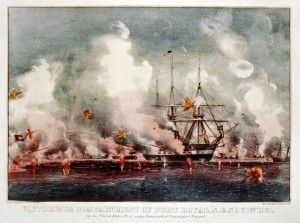 In its inaugural issue published on March 15, 1862 the New South, a weekly periodical with Northern sympathies, described the Union capture of Port Royal, South Carolina on November 7, 1861 as a “brisk little engagement with the enemy at Port Royal Ferry, in which the National forces, both Army and Navy manifested pluck and coolness the most desirable qualities in soldier’s or sailors.” This newspaper, which was highlighted in a previous post, documents life in occupied Port Royal through 1866 and is available online. As part of Union efforts to enforce the executive-mandated blockade on the South, Captain Samuel F. Du Pont, commander of the South Atlantic Blockading Squadron was sent to Port Royal, South Carolina where he helped capture Fort Walker and Fort Beauregard in the largest combined naval and military operation up to that point. The Civil War Blockade Strategy Board met during the summer of 1861 created a series of reports that informed the Union’s naval blockading strategy including Du Pont’s attack on Port Royal. Matthew Parker made these reports fully available on “Thomas Legion” a website that organizes Civil War primary documents for easy research. Other useful resources include the Library of Congress’s visual time line of the Civil War, which contains a collection of photographs from Port Royal, South Carolina from 1861 to 1865, a detailed essay on the battle of Port Royal, which appeared in the January 2001 issue of America’s Civil War.
In its inaugural issue published on March 15, 1862 the New South, a weekly periodical with Northern sympathies, described the Union capture of Port Royal, South Carolina on November 7, 1861 as a “brisk little engagement with the enemy at Port Royal Ferry, in which the National forces, both Army and Navy manifested pluck and coolness the most desirable qualities in soldier’s or sailors.” This newspaper, which was highlighted in a previous post, documents life in occupied Port Royal through 1866 and is available online. As part of Union efforts to enforce the executive-mandated blockade on the South, Captain Samuel F. Du Pont, commander of the South Atlantic Blockading Squadron was sent to Port Royal, South Carolina where he helped capture Fort Walker and Fort Beauregard in the largest combined naval and military operation up to that point. The Civil War Blockade Strategy Board met during the summer of 1861 created a series of reports that informed the Union’s naval blockading strategy including Du Pont’s attack on Port Royal. Matthew Parker made these reports fully available on “Thomas Legion” a website that organizes Civil War primary documents for easy research. Other useful resources include the Library of Congress’s visual time line of the Civil War, which contains a collection of photographs from Port Royal, South Carolina from 1861 to 1865, a detailed essay on the battle of Port Royal, which appeared in the January 2001 issue of America’s Civil War.
18
Jun
10
Battle of Jenkins’ Ferry (April 30, 1864)
Posted by sailerd Published in Civil War (1861-1865), Images, Maps Themes: Battles & SoldiersThe Battle of Jenkins’ Ferry took place in Grant county, Arkansas on April 30, 1864 as Confederate forces attempted to Union General Frederick Steele’s forces retreated across the Saline River. While Confederates attacked several times, they could not stop Steele’s men from crossing the river with their supplies. Andrew F. Sperry, who served with the 33rd Iowa Infantry Regiment, described the battle after the war:
“The conflict was terrible to experience, but brief to tell. Seven mortal hours, with such fierce vigor and determination that the fire of musketry became one undistinguishable and unbroken roar. Charge after charge was made by the yelling rebels, only to be broken upon our line, or if possibly succeeding for a moment, to give way at last to a charge of still deeper and more deadly determination from our own brave men.”
Confederates “forgot…the valor of Steele’s soldiers,” as another Union veteran explained.
continue reading "Battle of Jenkins’ Ferry (April 30, 1864)"
18
Jun
10
The Battle of Ball’s Bluff, October 21, 1861
Posted by rainwatj Published in Civil War (1861-1865), Images, Letters & Diaries, Maps, Places to Visit Themes: Battles & Soldiers The Battle of Ball’s Bluff, also known as the Battle of Harrison’s Island or Battle of Leesburg was fought on October 21, 1861 in Loudoun County, Virginia. In response to movement by Confederate Colonel Nathan G. Evans, Union Major General George B. McClellan ordered Brigadier General Charles P. Stone to conduct a “slight demonstration,” a show of force from the Maryland side of the Potomac River without the intention of having any troops cross or combat. After a small encounter with Confederate troops, Union soldiers were ordered to cross over the river into Virginia. Without the necessarily amount of boats, Union soldiers were unable to successfully engage the enemy. This poorly coordinated attack combined with a vigorous counterattack from Confederate soldiers led to a disastrous defeat for the Union including the death of Colonel Edward D. Baker, a United States Senator from Oregon. Estimated casualties for the Union Army totaled over 900 while the Confederates suffered only 150. The defeat had substantial political consequences in Washington D.C. with the establishment of the Congressional Joint Committee on the Conduct of the War.
The Battle of Ball’s Bluff, also known as the Battle of Harrison’s Island or Battle of Leesburg was fought on October 21, 1861 in Loudoun County, Virginia. In response to movement by Confederate Colonel Nathan G. Evans, Union Major General George B. McClellan ordered Brigadier General Charles P. Stone to conduct a “slight demonstration,” a show of force from the Maryland side of the Potomac River without the intention of having any troops cross or combat. After a small encounter with Confederate troops, Union soldiers were ordered to cross over the river into Virginia. Without the necessarily amount of boats, Union soldiers were unable to successfully engage the enemy. This poorly coordinated attack combined with a vigorous counterattack from Confederate soldiers led to a disastrous defeat for the Union including the death of Colonel Edward D. Baker, a United States Senator from Oregon. Estimated casualties for the Union Army totaled over 900 while the Confederates suffered only 150. The defeat had substantial political consequences in Washington D.C. with the establishment of the Congressional Joint Committee on the Conduct of the War.
Ted Ballard’s book Battle of Ball’s Bluff published by the U.S. Army Center of Military History provides the most extensive overview of the battle with a detailed account of the battle including maps, images, bibliographical sketches and further readings . The Library of Congress offers a number of resources including images of Baker’s death and the Union retreat. The Abraham Lincoln Papers at the Library of Congress is another valuable resource that contains transcribed military telegrams between generals and the President. The Ball’s Bluff Battlefield Regional Park and National Cemetery provides visitors a chance to explore the battle site with hiking trails and signs throughout the park. The Northern Virginia Regional Park Authority website also offers worthwhile information regarding the battle including an overview, cultural resources, a downloadable self guided audio tour and detailed battle maps.
18
Jun
10
The Battle of Stones River, December 31, 1862- January 3, 1863
Posted by mckelveb Published in Civil War (1861-1865), Images, Lesson Plans, Maps Themes: Battles & SoldiersThe Battle of Stones River (also known as the Battle of Murfreesboro) took place from December 31, 1862- January 3, 1863 in Rutherford County, Tennessee. Confederate General Braxton Bragg and the Army of Tennessee forced Union Major General William S. Rosecrans to the Nashville Pike, but the Union Army of the Cumberland was able to regain a strong position by crossing Stones River. The Confederate forces had to retreat and abandoned the battlefield on January 4-5. The National Park Service’s website provides an essay detailing the events of the battle and maps depicting troop movement. Other tools for teachers featured on the site are traveling trunks, lesson plans and teacher guides, and exhibits which provide students with an opportunity to learn about the Battle of Stones River interactively. The Civil War Preservation Trust’ s website includes a list of recommended books for the subject as well as several related historical articles. Also available on the website are historical maps and a photo gallery. Another selection on Google Books in limited view is No Better Place to Die: the Battle of Stones River as it gives a fairly detailed preview of the battle and there are also different reports from the battle’s commanding officers in Volume 20 of the Official Records. Alexander F. Stevenson commented on this event in his account of the battle:
“At 11 o’clock that night the rebel army commenced its retreat, and long before day break its infantry was miles away on the road towards Tullahoma and Shelbyville, while their cavalry withdrew slowly at daybreak, burning bridges as they moved south. While this retrograde movement of General Bragg’s army was going on, and each hour of this Sunday night was widening the distances between contending forces, our men lay in the muddy and rain-drenched ground, ready to attack at the earliest dawn to repel the enemy’s attacks. Soon, however, a report came, incredible at first, that the enemy had evacuated Murfreesboro’. Can it be true? was in everybody’s mouth, but few believed it; others argued that some hired spy had probably brought the news, to draw us out of our position, that the battle might be continued a few miles south of Murfreesboro’.”
